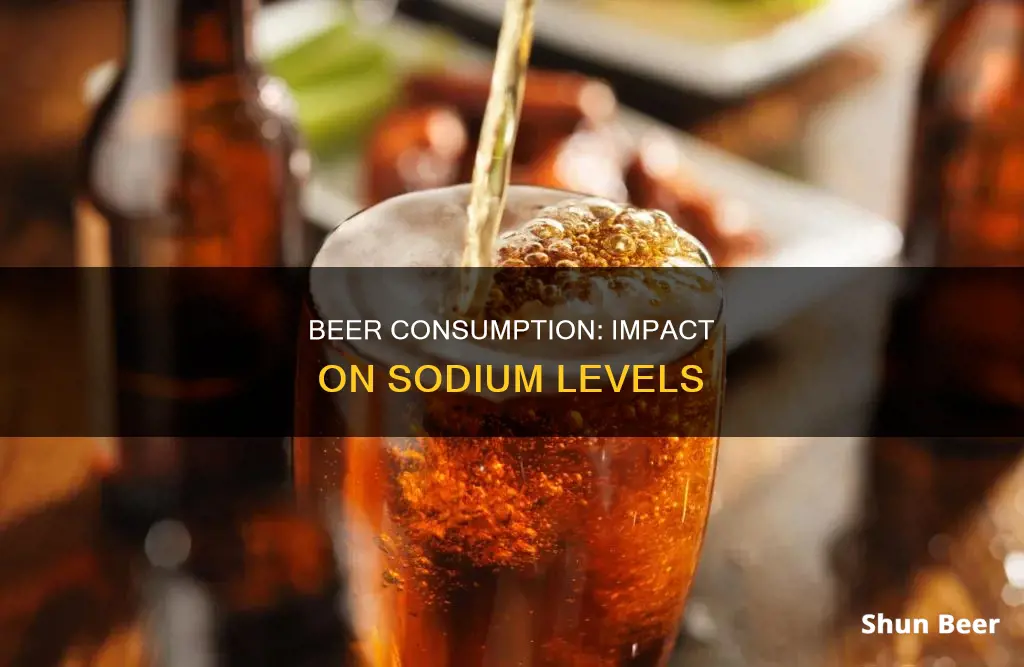
Drinking six beers a day can have a significant impact on your health, and it's important to understand the potential risks associated with excessive alcohol consumption. One concern is the development of a condition known as beer potomania or beer drinker's hyponatremia, which is characterised by abnormally low sodium levels in the blood due to the combination of excessive beer consumption and poor nutritional intake. This condition was first reported in 1972 and has been recognised as a serious health risk, especially when accompanied by underlying medical conditions.
| Characteristics | Values |
|---|---|
| Number of beers consumed by the patient in the first reported case of severe hyponatremia | 12 cans |
| Number of beers consumed by the patient in the second reported case of severe hyponatremia | 24 cans |
| Number of beers consumed by the patient in the third reported case of severe hyponatremia | 12 cans |
| Number of beers consumed by the patient in the fourth reported case of severe hyponatremia | 24 cans |
| Number of beers defined as heavy drinking | 6 or more |
| Calories in a standard beer | 150 |
| Weight gain from drinking 6 beers a day | 2 pounds a week |
What You'll Learn

Beer potomania
Causes
Beer contains a high amount of water and a low amount of sodium, creating an imbalanced water-to-salt ratio. This, combined with poor dietary habits, can lead to beer potomania. Individuals with chronically low sodium levels who frequently binge on beer or other alcoholic beverages are at risk, especially when overall nutrition is poor.
Symptoms
Symptoms of beer potomania often occur after a period of binge drinking and poor nutritional intake. They may include:
- Acutely altered mental state
- Muscle weakness, spasms, or cramps
- Loss of energy or fatigue
- Irritability or restlessness
- Inability to wake (coma)
Treatment
Treating beer potomania requires a careful approach. Rapidly increasing sodium levels can lead to neurological problems such as osmotic demyelination syndrome (ODS). In a review of 22 cases, 18% of patients with beer potomania developed ODS. Therefore, doctors recommend slowly increasing sodium levels over 48 hours.
If the patient is asymptomatic, doctors may opt for a liquid-restricted diet for 24 hours to allow the body to expel excess fluids and increase sodium concentration.
Beer and Sulfamethoxazole: Is It Safe to Drink?
You may want to see also

Hyponatremia
Drinking 6 beers a day can indeed affect your sodium levels, and in turn, cause hyponatremia.
Causes of Hyponatremia
In people with hyponatremia, the kidneys can become dysfunctional. Fluid builds up in the cells because there isn't enough sodium in the body. This is made worse by drinking fluids with a high water content, like beer. The sodium in the bloodstream becomes diluted by the extra water and can rapidly drop to a severely low level.
Symptoms of Hyponatremia
Symptoms of hyponatremia, also known as beer potomania, often follow an episode of binge drinking and poor nutritional intake. They may include:
- Acutely altered mental state
- Muscle weakness, spasms, or cramps
- Loss of energy or fatigue
- Irritability or restlessness
- Inability to wake (coma)
Treatment of Hyponatremia
Treating hyponatremia can be tricky and requires a delicate approach. While giving someone sodium may seem like the obvious treatment, this can be dangerous. Rapid reversal of sodium levels can lead to neurological problems, including a condition known as osmotic demyelination syndrome (ODS). Doctors now recommend a slow and careful administration of sodium over the course of 48 hours.
Beer and Prilosec: Safe Mix or Health Risk?
You may want to see also

Sodium and protein-rich foods
Drinking 6 beers a day can affect sodium levels and may lead to a condition known as "beer potomania" or "beer drinker's hyponatremia". This occurs when there is a dangerously low level of sodium in the bloodstream due to excessive beer consumption and inadequate intake of sodium and protein-rich foods.
Now, let's discuss sodium and protein-rich foods in detail:
Sodium-Rich Foods:
Sodium, in the form of salt (sodium chloride), is added to many processed foods and is naturally present in some as well. While sodium is essential for regulating fluid balance, blood volume, and blood pressure, excessive intake can lead to health issues. Here are some common sodium-rich foods:
- Canned and processed foods: Shrimp, soups, ham, pudding, canned vegetables, etc.
- Condiments and sauces: Soy sauce, barbecue sauce, salad dressings, ketchup, etc.
- Breads and baked goods: Bagels, pretzels, tortillas, pizza, biscuits, etc.
- Meats and poultry: Bacon, cold cuts, sausages, hot dogs, canned meats, etc.
- Dairy: Cottage cheese, processed cheese, regular yogurt, etc.
Protein-Rich Foods:
Protein is an essential nutrient for building and maintaining muscle mass and providing a sense of fullness. Here are some foods that are rich in protein:
- Meat: Chicken, beef, turkey, bison, pork
- Fish: Salmon, tuna, halibut
- Dairy: Eggs, Greek yogurt, cottage cheese, milk
- Nuts and seeds: Almonds, pistachios, pumpkin seeds, hemp seeds, nut butters
- Legumes: Beans (black, lima), lentils, chickpeas, peas
- Grains: Quinoa, oats, tempeh
- Vegetables: Broccoli, cauliflower, artichokes, asparagus, Brussels sprouts
It is important to note that while sodium is often associated with processed and packaged foods, protein-rich foods tend to be more natural and unprocessed.
Chilling Beer Fast: How Do Chiller Sticks Work?
You may want to see also

Alcohol dependence
According to a 2023 National Survey on Drug Use and Health, 28.1 million adults aged 18 and older (10.9% in this age group) in the US had Alcohol Use Disorder (AUD) in the past year. AUD is a medical condition characterised by an impaired ability to stop or control alcohol use despite adverse social, occupational, or health consequences. It is considered a brain disorder and can be mild, moderate, or severe. Lasting changes in the brain caused by alcohol misuse perpetuate AUD and make individuals vulnerable to relapse.
The risk factors for developing AUD include drinking at an early age, genetics and family history, and mental health conditions or a history of trauma. People with alcohol dependence often experience poor mental health, such as anxiety, depression, and suicidal feelings. This is partly because regular, heavy drinking interferes with the chemicals in our brains needed for good mental health. Alcohol dependence can also affect one's relationships, work, and finances, further contributing to mental health issues.
People who are becoming alcohol-dependent notice that they need to drink more to get the same effect. As dependence becomes more established, they may find themselves spending most of their time thinking about alcohol or engaging in activities to obtain or consume alcohol. They may experience physical symptoms of alcohol withdrawal, such as shaking, sweating, or nausea, when their blood alcohol level drops. In such cases, it can be dangerous to stop drinking completely or too quickly without medical support.
If you think you may be dependent on alcohol, it is important to consult a doctor or another medical professional before stopping drinking. There are also national alcohol support services that offer confidential advice and support.
Beer of the Month Club: How Does It Work?
You may want to see also

Cardiovascular disease
Drinking 6 beers a day can have a negative impact on cardiovascular health. Excessive alcohol consumption is a major risk factor for high blood pressure (hypertension), which is the leading cause of cardiovascular disease, including heart disease and stroke. Alcohol increases hormones that cause arteries to tighten and constrict, changing the amount of force used to pump blood around the body. It can also affect the nervous system, which helps regulate blood pressure, and impact receptors in blood vessels near the heart that help maintain blood pressure. Regular alcohol use often leads to increased body weight, which is a major risk factor for high blood pressure.
Beer and Prediabetes: What's Safe to Drink?
You may want to see also
Frequently asked questions
Beer potomania, or beer drinker's hyponatremia, is a condition caused by excessive beer consumption and inadequate sodium and protein-rich food intake. It leads to abnormally low sodium levels in the blood, resulting in a condition called hyponatremia.
Symptoms of beer potomania include acutely altered mental state, muscle weakness or cramps, fatigue, irritability, restlessness, and in severe cases, coma.
Beer has a high water content and a low sodium content. When individuals with chronically low sodium levels binge on beer, the kidneys can become dysfunctional, leading to a build-up of fluid in the cells. The extra water dilutes the sodium in the bloodstream, causing a rapid and severe drop in sodium levels.
Beer potomania can be prevented by maintaining a healthy and nutritious diet, including sufficient sodium and protein, and reducing or avoiding excessive alcohol intake.







